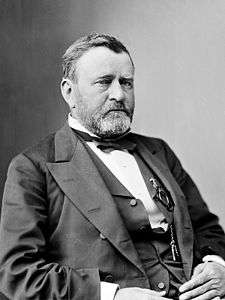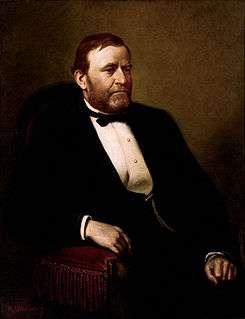Personal Memoirs of Ulysses S. Grant
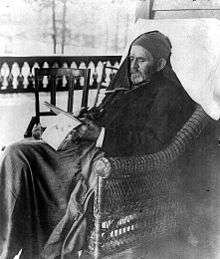
| ||
|---|---|---|
|
President of the United States Post-Presidency |
||
The Personal Memoirs of Ulysses S. Grant is an autobiography by Ulysses S. Grant, the 18th President of the United States, focused mainly on his military career during the Mexican–American War and the American Civil War. Written as Grant was dying of cancer in 1885, the two-volume set was published by Mark Twain shortly after Grant's death.
Twain created a unique marketing system designed to reach millions of veterans with a patriotic appeal just as Grant's death was being mourned. Ten thousand agents canvassed the North, following a script Twain had devised; many were themselves veterans who dressed in their old uniforms. They sold 350,000 two-volume sets at prices from $3.50 to $12 (depending on the binding). Each copy contained what looked like a handwritten note from Grant himself. In the end, Grant's widow Julia received about $450,000, suggesting a gross royalty before expenses of about 30%.[1][2]
The Personal Memoirs of Ulysses S. Grant has been highly regarded by the general public, military historians[3] and literary critics.[4] Positive attention is often directed toward Grant's prose, which has been praised as shrewd, intelligent, and effective. He portrayed himself in the persona of the honorable Western hero, whose strength lies in his honesty and straightforwardness. He candidly depicts his battles against both the external Confederates and his internal Army foes.[5] As of August 2015, the Ulysses S. Grant Presidential Library and Museum located at Mississippi State University is in the process of creating an annotated print edition of the memoirs. Under the management of the Executive Director of the Ulysses S. Grant Association John F. Marszalek, the project aims to reinvigorate interest in the memoirs by contextualizing it for the modern reader.[6]
Background
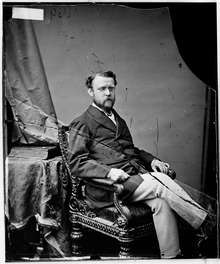
After finishing his second term in office in 1877, Grant and his wife Julia took a trip around the world which left him short on money. Nearly 60, the ex-president looked for something to engage his time. He ran for the Republican nomination for president in 1880, but lost to James Garfield. The next year, Grant moved to New York City to go into business with his son, Ulysses S. Grant, Jr., and a young investor, Ferdinand Ward, described by his great-grandson Geoffrey Ward as "a very plausible, charming, unobtrusive, slender person with a genius for finding older people and pleasing them, which he learned early on."[7]
The firm of Grant & Ward did well at first, bolstered by Ward's skills and Grant's name. The former president bragged to friends that he was worth two and a half million dollars, and family members and friends poured money into the firm. But Grant was largely disengaged from the company's business, often signing papers without reading them.[7]
This proved disastrous, as Ward had used the firm as a Ponzi scheme, taking investors' money and spending it on personal items, including a mansion in Connecticut and a brownstone in New York City. Grant & Ward failed in May 1884, leaving Grant penniless.
That fall, the former president was diagnosed with terminal throat cancer. Facing his mortality, Grant struck a publishing deal with his friend Mark Twain and began working on his memoirs, hoping they would provide for his family after his death. In the early stages of his work, Grant had the assistance of Adam Badeau, an author who had served on Grant's staff during the war. Badeau left before the project was complete, having disputed with Grant and his family how much Badeau would be paid and how he would be credited for his research, editing and fact checking. After Grant's death, Badeau settled with Grant's heirs for $10,000, or about $250,000 in 2012 dollars.[8]
Grant suffered greatly in his final year. He was in constant pain from his illness and sometimes had the feeling he was choking. Despite his condition, he wrote at a furious pace, sometimes finishing 25 to 50 pages a day.[7] In June 1885, as the cancer spread through his body, the family moved to Mount MacGregor, New York, to make Grant more comfortable. Propped up on chairs, and too weak to walk, Grant worked to finish the book. Friends, admirers and even a few former Confederate opponents made their way to Mount MacGregor to pay their respects. Grant finished the manuscript on July 18; he died five days later.
Structure
The Memoirs are divided into two volumes. The autobiography is unusual but not unique in that large sections of Grant's life (most notably, his childhood and his presidency) are given brief mention or not discussed at all. The focus of the book is Grant's military career—his service in the Mexican-American War and the Civil War.
Grant's writing has been praised for its conciseness and clarity—a sharp contrast from contemporary Civil War memoirs, which tended to reflect the Victorian fondness for elaborate (and sometimes overblown) language.
With regard to the Mexican–American War, Grant recorded his belief that it had been waged unjustly:
Generally, the officers of the army were indifferent whether the annexation was consummated or not; but not so all of them. For myself, I was bitterly opposed to the measure, and to this day regard the war, which resulted, as one of the most unjust ever waged by a stronger against a weaker nation. It was an instance of a republic following the bad example of European monarchies, in not considering justice in their desire to acquire additional territory.[9]
His account of Lee's surrender at Appomattox Court House is particularly notable:
When I had left camp that morning I had not expected so soon the result that was then taking place, and consequently was in rough garb. I was without a sword, as I usually was when on horseback on the field, and wore a soldier's blouse for a coat, with the shoulder straps of my rank to indicate to the army who I was. When I went into the house I found General Lee. We greeted each other, and after shaking hands took our seats. I had my staff with me, a good portion of whom were in the room during the whole of the interview.
What General Lee's feelings were I do not know. As he was a man of much dignity, with an impassible face, it was impossible to say whether he felt inwardly glad that the end had finally come, or felt sad over the result, and was too manly to show it. Whatever his feelings, they were entirely concealed from my observation; but my own feelings, which had been quite jubilant on the receipt of his letter, were sad and depressed. I felt like anything rather than rejoicing at the downfall of a foe who had fought so long and valiantly, and had suffered so much for a cause, though that cause was, I believe, one of the worst for which a people ever fought, and one for which there was the least excuse. I do not question, however, the sincerity of the great mass of those who were opposed to us ...
We soon fell into a conversation about old army times. He remarked that he remembered me very well in the old army; and I told him that as a matter of course I remembered him perfectly, but from the difference in our rank and years (there being about sixteen years' difference in our ages), I had thought it very likely that I had not attracted his attention sufficiently to be remembered by him after such a long interval. Our conversation grew so pleasant that I almost forgot the object of our meeting. After the conversation had run on in this style for some time, General Lee called my attention to the object of our meeting, and said that he had asked for this interview for the purpose of getting from me the terms I proposed to give his army.[10]
Grant also makes asides to clear up legends that had grown up around his leadership. After dismissing one tale, Grant wrote "Like many other stories, it would be very good if it were only true."
The narrative ends shortly after the Army of the Potomac's final review in Washington in May 1865. Grant deliberately avoids comment on Reconstruction, apart from saying that he favored black suffrage. The final chapter, "Conclusion," is a reflection on the war and its effects, the actions of foreign countries during it, and the reconciliation of North and South. In the final paragraphs, Grant makes note of his own condition and expresses optimism that "Federal and Confederate" can live together.
I cannot stay to be a living witness to the correctness of this prophecy; but I feel it within me that it is to be so. The universally kind feeling expressed for me at a time when it was supposed that each day would prove my last, seemed to me the beginning of the answer to "Let us have peace."
The expression of these kindly feelings were not restricted to a section of the country, nor to a division of the people. They came from individual citizens of all nationalities; from all denominations—the Protestant, the Catholic, and the Jew; and from the various societies of the land—scientific, educational, religious or otherwise. Politics did not enter into the matter at all.
I am not egotist enough to suppose all this significance should be given because I was the object of it. But the war between the States was a very bloody and a very costly war. One side or the other had to yield principles they deemed dearer than life before it could be brought to an end. I commanded the whole of the mighty host engaged on the victorious side. I was, no matter whether deservedly so or not, a representative of that side of the controversy. It is a significant and gratifying fact that Confederates should have joined heartily in this spontaneous move. I hope the good feeling inaugurated may continue to the end.[11]
The work was published in a two-volume set after his death, yet it contains his signature. The signature however, is printed. It reads: "These volumes are dedicated to the American Soldier and Sailor. / U. S. Grant / New York City / May 23rd, 1885." There are also numerous facsimile letters and correspondence bound into Volume II.[12]
Public opinion
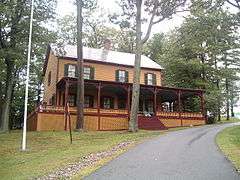
The press and public followed Grant's symptoms throughout his final year, and his work on the book was well known. While interest in his memoirs would have been high had Grant not been ill, his struggle to finish it before his death gave it even more attention.
On release, the book received universal critical praise. Twain compared the Memoirs to Julius Caesar's Commentaries. Matthew Arnold praised Grant and his book in an 1886 essay. Twain, however, felt Arnold's tone was condescending to both Grant and the United States, and the two authors feuded until Arnold's death in 1888. Gertrude Stein also admired the book, saying she could not think of Grant without weeping.[13] The Memoirs quickly became a best seller. The Grant family, who received 75% of the net royalties (after expenses), made approximately $450,000 (greater than $10 million in 2009 dollars) from the book, re-establishing their fortune.
Ulysses S. Grant sought to deliver his moral, political, economic and social argument for waging the war against the South in his Personal Memoirs. As the commander of the Union army and a two-term president, he had a unique perspective on the war that interested both the public and historical scholars, as they wanted to hear his side of the story. Although he was a clear figure in the public eye, Grant was unknown to many people. After the war, famous general William T. Sherman remarked that, although he had known Grant for decades, "to me he is a mystery, and I believe he is a mystery to himself."[14] In his Personal Memoirs, Grant portrayed himself as representative character of the North. In volume 1, he describes his family background and points to his simple upbringing as the reason for his solid, restrained virtues of a normal Northerner. [15]
Grant goes to the point of declaring himself as “unmilitary” while continually stressing his simple nature. Grant stated that he did not even want to attend West Point, only going because his father thought it would be best, as Grant believed "a military life had no charms for me." Grant wrote of his participation in the Mexican War of 1846-1848, a war he did not support. Grant believed it was very unjust for the larger, stronger United States to pick on a weaker country as they were doing.[16]
Grant used his Personal Memoirs as a way to respond to negative criticism immediately following the war, especially present in his description of the Battle of Shiloh. The two leading generals of the Union army at Shiloh were Grant and General Don Carlos Buell and they had very differing accounts of the battle. Many criticized Grant for being tremendously unprepared and Buell goes as far to credit himself for the victory, while Grant proclaims the opposite story, stating the Union win was inevitable.[17] Grant was able to use this book to portray his own personal memories of the events of the war and dispute any negative press he may have received. However, in particular, Grant's depiction of the Battle of Shiloh, is still being disputed to this day. Pulitzer Prize-winning historian Bruce Catton was persuaded by Grant and has since stated Grant was a "truly great general" and applauded Grant's grit at Shiloh.[18]
Grant also used his Personal Memoirs to explain his battlefield action and his motives for the way he led. After the war, Grant was portrayed as a ruthless leader who stopped at nothing to make sure the South was destroyed. However, Grant felt this was a harsh evaluation and sought to improve the public opinion of himself and defend the fact he believed he was a simple and fair man. Grant felt he was being abused by newspaper coverage that he believed was shoddy, inaccurate and defeatist. He stated, "Up to the Battle of Shiloh, I, as well as thousands of other citizens, believed that the rebellion against the Government would collapse suddenly and soon, if decisive victory could be gained over any of its armies. … After Shiloh, I gave up all idea of saving the Union except by complete conquest. … The Northern troops were never more cruel than the necessities of war required."[19] Geoffrey Perret, the author of Ulysses S. Grant: Soldier and President staunchly disagreed with Grant's assertion that he was acting out of necessity and declared Grant's wartime conquests were against his Northern virtues. In Perret's eyes, Grant was "above all a soldier, and not a reluctant one." Perret argued that Grant in fact liked West Point, had few reservations at the time about the Mexican War and was a very good junior officer. Perret backs these accusations with the fact Grant, while appointed the General-in-Chief, "evolved the future of the United States Army" by applying "maximum firepower, maximum mobility" while relying on "the wide envelopment" as his principal form of maneuver.[20]
Mark Twain's opinion
I had been comparing the memoirs with Caesar's Commentaries. ... I was able to say in all sincerity, that the same high merits distinguished both books—clarity of statement, directness, simplicity, unpretentiousness, manifest truthfulness, fairness and justice toward friend and foe alike, soldierly candor and frankness, and soldierly avoidance of flowery speech. I placed the two books side by side upon the same high level, and I still think that they belonged there.[21]
Modern edition
As of August 2015, the Ulysses S. Grant Presidential Library and Museum located at Mississippi State University is in the process of creating an annotated print edition of the memoirs. Under the management of the Executive Director of the Ulysses S. Grant Association John F. Marszalek, the project aims to reinvigorate interest in the memoirs by contextualizing it for the modern reader.[22]
References
- Grant, Ulysses S. Personal Memoirs of U. S. Grant. New York: Charles L. Webster & Company, 1885–86. ISBN 0-914427-67-9.
Notes
- ↑ Miller, Craig E. "'Give the Book to Clemens'," American History, April 1999, Vol. 34, Issue 1
- ↑ see also Booknotes interview with Mark Perry on Grant and Twain: The Story of a Friendship That Changed America, July 18, 2004.
- ↑ Rafuse, Ethan Sepp. "Still a Mystery? General Grant and the Historians, 1981–2006," Journal of Military History, (July 2007) vol. 71, no. 3, pp. 849–874 in Project MUSE
- ↑ Wilson, Edmund. Patriotic Gore: Studies in the Literature of the American Civil War, (1962) pp. 131–173.
- ↑ Russell, Henry M. W. "The memoirs of Ulysses S. Grant: The rhetoric of judgment," Virginia Quarterly Review, (Spring 1990) vol. 66, no. 2, pp. 189–209.
- ↑ http://digital.library.msstate.edu/cdm/landingpage/collection/USG_volume
- 1 2 3 Transcript of PBS biography of Grant
- ↑ New York Times, "Gen. Badeau's Suit Ended", October 31, 1888
- ↑ "Ulysses S Grant Quotes On West Point and the Mexican War – Fadedgiant Online Author Autograph Guide – Books, Links, Quotes". Fadedgiant.net. Retrieved 2011-02-05.
- ↑ "Grant, Personal Memoirs, Chapter LXVII". Bartleby.com. Retrieved 2011-02-05.
- ↑ "Grant, Personal Memoirs, Conclusion". Bartleby.com. Retrieved 2011-02-05.
- ↑ Kathenes, Brian G. ISA, S-CAPP "Signed Books That Are Not Autographed, Conclusion". National Appraisal Consultants. Retrieved 2013-02-09.
- ↑ "Review of Grant's Memoirs at Powell's Books". Powells.com. 2011-01-18. Retrieved 2011-02-05.
- ↑ Rafuse, Ethan Sepp. "Still a Mystery? General Grant and the Historians, 1981–2006." The Journal of Military History, (July 2007) vol. 71, no. 3, pp. 849–874.
- ↑ Waugh, Joan. The Memory of the Civil War in American Culture. (North Carolina: The University of North Carolina Press, 2004).
- ↑ Waugh, Joan. The Memory of the Civil War in American Culture. (North Carolina: The University of North Carolina Press, 2004).
- ↑ Rafuse, 850–851.
- ↑ Rafuse, 850-851.
- ↑ Waugh, 28.
- ↑ Rafuse, 859.
- ↑ Twain, Mark. Autobiography of Mark Twain, Vol. II (New York: Harper & Brothers, 1924)
- ↑ http://digital.library.msstate.edu/cdm/landingpage/collection/USG_volume
External links
- complete text of Personal Memoirs of Ulysses S. Grant at Project Gutenberg
- Ulysses S. Grant: Friend Mark Twain Offers Terms for Publication of Memoirs Shapell Manuscript Foundation
-
 Personal Memoirs of U. S. Grant public domain audiobook at LibriVox
Personal Memoirs of U. S. Grant public domain audiobook at LibriVox
